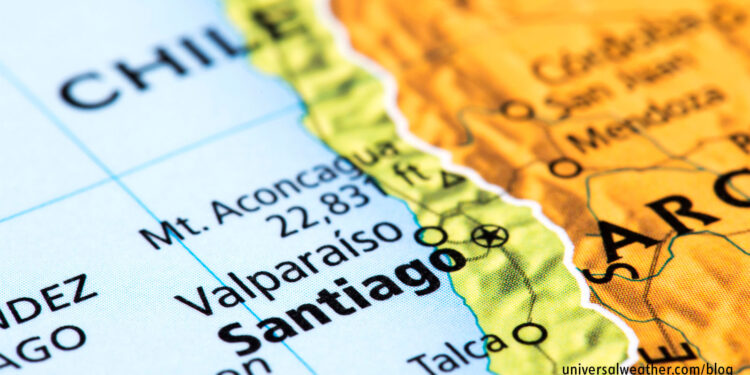Bizav Ops to Santiago, Chile for FIDAE 2016 – Part 2: Permits, CIQ & Visas

This is a post by author Mariana Tsymbalista. Mariana is the FBO Assistant at Aviasur, a Universal Aviation® Certified ground handler, which has an FBO in Santiago, Chile and provides ground support throughout the country. Mariana is an expert on business aircraft operations in Chile and can be contacted at marianatsymbalista@univ-wea.com.
This business aviation blog post continues from our article last week, entitled “Bizav Ops to Santiago, Chile for FIDAE 2016 – Part 1: Airports & Parking.”
FIDAE 2016 takes place March 29 – April 3 in Santiago, Chile. Business aircraft operators traveling to Chile need to ensure that proper landing permits are obtained. If airport slots are implemented for A. Merino Intl (SCEL), the host airport, during the FIDAE 2016 period, they will be on a first-come-first-serve basis. Also, be aware of customs, immigration, and quarantine (CIQ) processes and requirements when traveling to Chile.
The following is an overview of what you need to know:
1. Chilean landing permits
Landing permits are required for all private non-revenue and charter (non-scheduled commercial) operations to Chile, and the application process is the same for both types of flights. Although no document submissions are required with Chilean landing permit requests, at least 48 hour lead time must be provided to the Civil Aviation Authority (CAA).
2. Airport slots and PPRs
Airport slots and prior permission required (PPR) are normally not needed at SCEL, but these requirements may be put in place beginning early March due to expected increased traffic volumes. NOTAMs may be issued, with specific restrictions and other pertinent information, for this event period.
3. CAA permit processing and revisions
CAA processes landing permits for Chile and is available 24/7. Permits need to be requested a minimum of 48 hours in advance and, once approved, remain valid for 30 days from date of arrival. If you stay in country more than 30 days, an additional permit may be applied for, giving you up to 60 additional days in Chile. Permit revisions are not needed for schedule changes, destination changes or passenger/crew changes. However, if you change aircraft tail number a new permit is needed.
4. Documentation required on landing
Documentation that needs to be sent to your ground handler in advance and should be onboard your aircraft and available upon arrival includes:
- airworthiness and registration certificates
- worldwide insurance, with expiration date noted on the certificate
- reduced vertical separation minimum (RVSM) status
- pilot licenses and medicals
5. CIQ clearance
CIQ at SCEL takes place either within the FBO or the main terminal, depending upon which ground handler you’re using. For ground handlers with FBO facilities, you’ll clear in the FBO, and this takes no more than 10 minutes assuming all documentation is ready and forms have been filled out. Passports and visas will be checked, arrival cards processed and luggage quickly scanned. Main terminal clearance, on the other hand, depends on traffic volume. Passengers/crew clear alongside scheduled commercial passengers in the terminal and the process can take 30-60 minutes. The longer processing time is due in part to strict agricultural checks and the need to both scan and visually inspect each piece of luggage separately.
6. Visa and reciprocity fees
Crew members listed on the gen dec do not require visas for Chile, regardless of nationality. However, passengers do require visas depending upon nationality. Certain nationalities are able to obtain visas on arrival while others require visas prior to arrival. It’s recommended to confirm visa requirements with your 3rd-party provider or handler well in advance of the day of operation. Note that nationals of Albania, Australia, and Mexico are also subject to reciprocity fees of 30 USD, 117 USD and 23 USD, respectively. These fees must be paid via a special line in the main terminal, prior to passengers being processed by CIQ. Be aware that if you’re clearing CIQ in the FBO, your handler will need to take passenger passports to the main terminal, and then return them to the FBO, prior to passengers being able to clear CIQ. For more information on visas for Chile see the government’s official site.
7. Agricultural and pet restrictions in Chile
Upon international arrival all fresh meat products, fruits and vegetables must be properly disposed of. Only pre-packaged and sealed food products may be kept onboard your aircraft.
Onboard pets can be temporarily imported so long as proper health certificates and vaccination certificate are provided. This should be forwarded to your handler in advance so they can make appropriate arrangements with local authorities.
8. In-flight catering
In-flight caterers are available at SCEL, and it’s recommended to provide 24 hours notification for basic catering requests and at least 48 hours for specific or specialty requests. Catering at SCEL can be ordered through an Air Culinaire Worldwide approved catering partner. Here is a guide to understanding Chilean cuisine.
Conclusion
It’s recommended that all permit, aircraft support and crew accommodation arrangements be made in advance to avoid any potential issues. More information on airport slots and NOTAMs will be known in March. Also, be aware of visa requirements and reciprocity fee requirements for specific nationals.
Questions?
If you have any questions about this article or would like assistance planning your next trip to Chile, contact me at marianatsymbalista@univ-wea.com.




